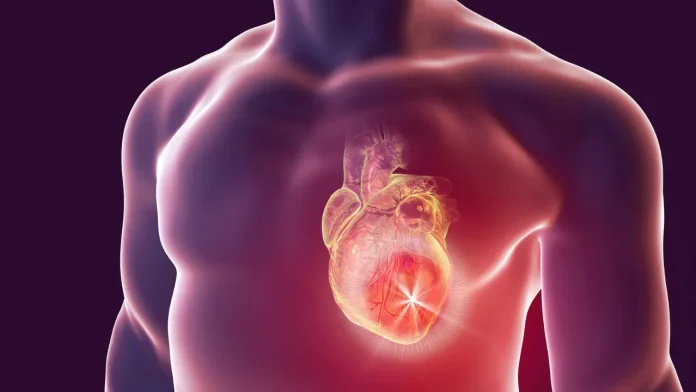Cardiovascular disease is the leading cause of illness and death globally, claiming an estimated 17.9 million lives each year. The underlying factors for this range from poor eating habits to the lack of a consistent exercise regimen. If you’ve recently grappled with this health issue, you might find yourself perplexed about the next steps to take. Fortunately, advancements in technology and medication over the years have been significant in addressing this health challenge, facilitating the recovery process, and helping individuals regain their vitality.
The best way to navigate and rebound from this formidable disease is to understand how it works and be knowledgeable on potential treatment avenues. This article will discuss the nuances of this dangerous disease, including its symptoms, treatment options, and the inspiring heart disease reversal success stories of those who have conquered this vascular ailment. Furthermore, we will explore how nutritional supplements like Kori Krill Oil Softgels 1200 mg can work in conjunction with conventional treatments to create a holistic approach to protecting your heart and overall wellness.
You May Also Like:
Support Your Heart Health: Comparing 2 Top Supplements
Heart Disease: How High Cholesterol Combined With High Blood Pressure Increases Risk
Beat the Odds After Heart Disease: Heart Disease Reversal Success Stories to Inspire Your Recovery is an original (OptimalHealthNews) article.
Inspiring heart disease reversal success stories:
Understanding heart disease
Heart disease, also referred to as cardiovascular disease (CVD), is a broad term encompassing a cluster of conditions that primarily affect the heart and blood vessels. Among these conditions, coronary artery disease (CAD) stands out as the most prevalent and well-known subcategory of this disease. Often used interchangeably with ischemic heart disease, CAD holds the distinction of being the leading form of heart disease globally. It arises from the gradual accumulation of plaque within the coronary arteries, leading to reduced blood flow to the heart—a condition known as ischemia, where there is an insufficient oxygen supply to the heart muscle.
Understanding the causative factors behind heart disease is fundamental in formulating prevention and management strategies. Key contributors to heart disease include:
High Blood Pressure (Hypertension): Hypertension is a frequent risk factor in heart disease. Elevated blood pressure places excessive strain on the heart, leading to structural changes in the heart muscle and an increased vulnerability to heart ailments.
Smoking: Cigarette smoking is a well-established risk factor for heart disease. The chemicals in tobacco smoke can damage the lining of blood vessels, triggering inflammation and accelerating the formation of arterial plaque.
Family History: A familial predisposition to heart disease can also heighten an individual’s risk. Genetics can play a role in factors such as cholesterol metabolism and blood clotting, rendering certain individuals more susceptible to heart-related issues.
Obesity: Excess body weight, particularly when accompanied by unhealthy dietary choices and sedentary lifestyles, can precipitate heart disease. Obesity strains the heart and contributes to conditions like hypertension and diabetes.
Understanding the complexities of heart disease, including its multiple subtypes and intricate causative factors, is pivotal in our ongoing battle against this pervasive and life-threatening condition. To combat heart disease effectively, it is essential not only to recognize its causes but also to stay informed about its symptoms, prognosis, and treatment options. These aspects will be explored in the subsequent sections of this article.

Inspiring heart disease reversal success stories:
Symptoms of heart disease
Recognizing the symptoms of heart disease is crucial for early intervention and future prevention. Common symptoms include:
1. Chest Pain (Angina)
Angina, often described as chest pain or discomfort, is a hallmark symptom of heart disease. It occurs when the heart muscle receives insufficient oxygen due to reduced blood flow, typically resulting from narrowed coronary arteries. Angina can be characterized by:
- A sensation of pressure, tightness, or squeezing in the chest.
- Pain that may radiate to the left arm, neck, jaw, or back.
- Discomfort triggered by physical exertion or emotional stress and relieved by rest or medications (nitroglycerin).
2. Shortness of Breath (Dyspnea)
Heart disease can impair the heart’s ability to pump blood effectively. This reduced cardiac output may lead to a buildup of fluid in the lungs, causing dyspnea or shortness of breath. Individuals with heart disease may experience:
- Breathlessness during physical activity or even at rest.
- Difficulty lying flat, necessitating the use of more pillows or sitting upright to breathe comfortably.
- Wheezing or crackling sounds in the lungs.
3. Irregular Heartbeat (Arrhythmias)
Arrhythmias refer to abnormal heart rhythms, which can be associated with heart disease. Common arrhythmias include:
- Palpitations, characterized by a sensation of rapid, fluttering, or irregular heartbeats.
- Dizziness or lightheadedness.
- Fainting spells (syncope) in severe cases.
Inspiring heart disease reversal success stories:
Complications of heart disease
Untreated or poorly managed heart disease can give rise to an array of serious complications. These complications often emerge as the disease progresses and can significantly impact an individual’s quality of life and overall health. Some of the potential complications of heart disease include:
- Heart Attack (Myocardial Infarction): A heart attack occurs when there is a sudden blockage of blood flow to a portion of the heart muscle. This can lead to permanent damage to the heart muscle and can be life-threatening.
- Stroke: Heart disease can increase the risk of blood clots forming within the heart, which may travel to the brain and cause a stroke. Stroke can result in neurological deficits and long-term disability.
- Heart Failure: Heart failure is a condition in which the heart’s ability to pump blood efficiently is compromised. It can lead to symptoms such as fatigue, shortness of breath, and fluid retention.
- Arrhythmias: Irregular heart rhythms (arrhythmias) can result from heart disease, leading to palpitations, dizziness, fainting, or, in severe cases, cardiac arrest.
- Sudden Cardiac Death: In some cases, heart disease can culminate in sudden cardiac death, often due to ventricular arrhythmias. This is a catastrophic event with a poor prognosis if immediate medical attention is not available.
Understanding these potential complications underscores the importance of early diagnosis, effective treatment, and ongoing management of heart disease. These measures can significantly mitigate these risks and improve overall prognosis.

Inspiring heart disease reversal success stories:
Treatment approaches
The treatment of heart disease typically involves a combination of lifestyle changes and medical interventions. Common treatment modalities include:
- Medications: Drugs like statins, beta-blockers, and ACE inhibitors help control blood pressure, cholesterol levels, and heart rhythm.
- Lifestyle Modifications: Adopting a heart-healthy diet, engaging in regular exercise, quitting smoking, and managing stress are key lifestyle changes that contribute significantly to heart disease management.
- Medical Procedures: In severe cases, procedures like angioplasty, stent placement, or bypass surgery may be necessary to restore blood flow to the heart.
Furthermore, significant strides in heart disease management have been made in recent years, bringing new hope to patients through more advanced and innovative treatment options. While conventional treatments remain crucial, emerging therapies and interventions are expanding the horizon of possibilities. Here are notable developments in this field:
Precision Medicine: Precision medicine has gained prominence as a tailored approach to heart disease management. It involves the customization of treatment plans based on an individual’s unique genetic makeup, lifestyle, and medical history. Genetic testing and advanced diagnostic tools help identify specific risk factors and genetic mutations that may predispose individuals to heart disease.
Minimally Invasive Procedures: Advancements in interventional cardiology have led to a growing array of minimally invasive procedures for heart disease management. Procedures such as percutaneous coronary intervention (PCI) and transcatheter aortic valve replacement (TAVR) offer alternatives to traditional open-heart surgery. Minimally invasive approaches typically result in shorter hospital stays, quicker recovery times, and reduced postoperative complications, making them an attractive option for eligible patients.
Remote Monitoring and Telehealth: The integration of technology into cardiac care has revolutionized patient monitoring and follow-up. Remote monitoring devices, such as wearable heart rate monitors and implantable cardiac devices, enable healthcare providers to continuously track patients’ heart health. Telehealth services allow patients to consult with their healthcare teams from the comfort of their homes, ensuring timely intervention and ongoing care, which is particularly beneficial for those in remote or underserved areas.
Regenerative Therapies: Regenerative medicine holds promise for repairing damaged heart tissue. Stem cell therapies and tissue engineering approaches are being explored as potential treatments to restore heart function in individuals with heart failure or tissue damage stemming from heart attacks. While these therapies are still in experimental stages, they represent a frontier in cardiac care research.
Incorporating these treatment approaches into heart disease management requires a multidisciplinary approach involving cardiologists, geneticists, interventional radiologists, and other specialists. As both traditional and innovative strategies continue to evolve, they offer renewed hope for improved prognosis and a brighter future for patients facing the challenges of heart disease.
Inspiring heart disease reversal success stories
While heart disease is a formidable opponent, numerous individuals have reversed their conditions through determination and adherence to heart-healthy lifestyles. These inspiring heart disease reversal success stories serve as beacons of hope and motivation for those facing similar challenges:
1. John’s Triumph Over CAD
John, a 58-year-old accountant, was diagnosed with coronary artery disease after experiencing chest pain. He embarked on a journey of regular exercise, adopted a balanced diet, and adhered to medication as prescribed. Over time, his symptoms improved, and follow-up tests revealed a notable reduction in plaque buildup within his arteries.
2. Sarah’s Recovery from Heart Failure
Sarah, a 46-year-old teacher, struggled with heart failure due to years of untreated hypertension. With the guidance of her healthcare team, she managed her blood pressure, engaged in cardiac rehabilitation, and made dietary changes. Today, Sarah leads an active life, a testament to the power of dedication to one’s recovery.
3. Mark’s Arrhythmia Resolution
Mark, a 63-year-old retiree, experienced irregular heartbeats that disrupted his daily life. Through medications and lifestyle modifications, he successfully managed his arrhythmia. His story underscores the potential for improvement and recovery in the face of heart-related challenges.

Exploring nutritional supplements to complement heart disease management
While conventional treatments for heart disease are well-established, the exploration of nutritional supplements as adjunctive therapies has gained considerable attention. These supplements, when used in conjunction with prescribed medications and beneficial lifestyle modifications, may offer potential benefits in supporting heart health. Here are a few of the benefits you obtain from using such supplements.
1. Omega-3 Fatty Acids
Omega-3 fatty acids, found in fatty fish and certain plant-based sources, have garnered significant interest for their potential cardiovascular benefits. Notably, Kori Krill Oil Softgels 1200 mg emerge as an ideal source of omega-3s, particularly eicosapentaenoic acid (EPA) and docosahexaenoic acid (DHA). Research suggests that these omega-3s may help reduce inflammation, lower triglyceride levels, and improve overall heart health. Additionally, they have demonstrated the ability to reduce the risk of arrhythmias and decrease blood pressure modestly. Moreover, Kori Krill Oil is clinically proven to elevate the omega-3 index and is a doctor-recommended omega-3 source.
2. Coenzyme Q10 (CoQ10)
Coenzyme Q10, or CoQ10, is a naturally occurring antioxidant in the body that plays a crucial role in cellular energy production. Research has suggested that CoQ10 may benefit individuals with heart disease, particularly those with heart failure. It may enhance the heart’s pumping function, improve exercise tolerance, and alleviate symptoms of heart failure. CoQ10 may be considered for individuals with heart conditions, although its effectiveness can vary.
3. Plant Sterols
Plant sterols, also known as phytosterols, are compounds found in plant-based foods. They bear structural similarities to cholesterol and can help lower LDL (low-density lipoprotein) cholesterol levels. Consuming foods fortified with plant sterols or taking supplements may be an option for individuals struggling to manage their cholesterol levels through diet alone. However, it is crucial to use plant sterol supplements under the guidance of a healthcare provider, as they may interact with certain medications.
While supplements can complement conventional treatments, it’s important to consult with a healthcare professional before incorporating them into your healthcare regimen. Individual responses to supplements may vary, and they should not replace prescribed medications or lifestyle changes.
Beat the odds to reverse heart disease
Heart disease is a formidable illness affecting individuals of all ages, genders, and states of well-being. That said, being informed about how the disease works, its root causes, and the proactive measures available for both prevention and recovery has proven effective in mitigating its onset and improving the healing process for those who have recently encountered it. Additionally, carefully selected nutritional supplements may offer complementary support in managing heart disease. However, it’s essential to approach such supplements as part of a holistic treatment plan, preferably under the guidance of a healthcare professional.
Remember that every individual’s journey to recovery is unique, and your journey will likely have its own combination of successes and challenges. By taking proactive steps to address heart disease, seeking inspiration from those who have overcome it, and acknowledging your innate capacity to heal and grow throughout the recovery stages, you can beat the odds and work towards nurturing a healthier heart and a brighter future.

Additional Reading:
Mayo Clinic: Coronary Heart Disease: Symptoms and Causes
American Addition Centers: Substance Abuse & Heart Damage, Disease, Complications
Medical News Today: What Are the Best Foods for Heart Health?
Cleveland Clinic: Heart Attack Recovery and Rehabilitation
Everyday Health: Best and Worst Supplements for Heart Health
Important Note: The information contained in this article is for general informational purposes only, and should not be construed as health or medical advice, nor is it intended to diagnose, prevent, treat, or cure any disease or health condition. Before embarking on any diet, fitness regimen, or program of nutritional supplementation, it is advisable to consult your healthcare professional in order to determine its safety and probable efficacy in terms of your individual state of health.
Regarding Nutritional Supplements Or Other Non-Prescription Health Products: If any nutritional supplements or other non-prescription health products are mentioned in the foregoing article, any claims or statements made about them have not been evaluated by the U.S. Food and Drug Administration, and such nutritional supplements or other health products are not intended to diagnose, treat, cure, or prevent any disease.
